“Think of your bike as your child,” says Tsai Shih-chiang (蔡士強), “because you have to pay a half fare to take it with you on the train.”
Tsai doesn’t have any children; no human ones at least. He has four bicycles. His current favorite is his trail bike because, after giving up triathlons, his favorite cycling is off-road. And since Taipei, where Tsai lives, is not great for trail riding, his weekends usually start and finish with a train journey to Yilan and back. Or Hsinchu. Or Taichung or further afield.
TRAINS ...
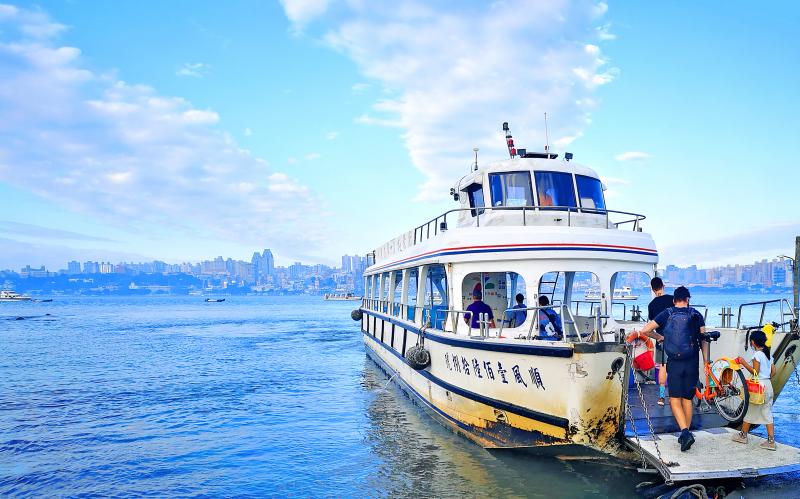
Photo: Mark Caltonhill
And, as Tsai says, the Taiwan Railways Administration (TRA) charges 50 percent extra for your bike.
For local trains, you can pretty much turn up, buy your tickets and jump on, though space can be limited. On faster trains, which have a designated cycle carriage, booking is almost essential.
You could always send your bike as freight, but unless you can persuade a TRA employee that your bike is really just a bike-shaped bag, it works out more expensive than paying the extra half-fare. Furthermore, this service is only available at a limited number of stations, which does not include Taipei Main.
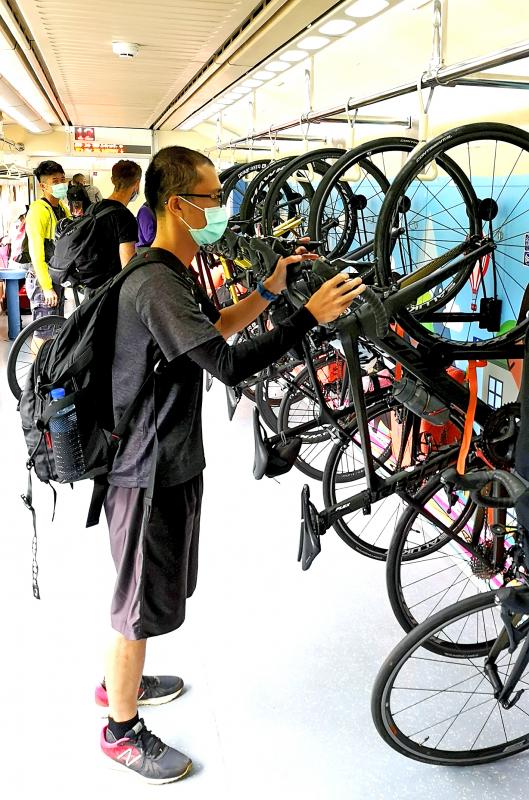
Photo: Mark Caltonhill
Another alternative is to put your bike in a bag, in which case it is free and can be taken on any train from any station.
“That’s just a gender tax,” says Sophia Wu, whose slight build is useful on hill-climbing events, but who has enough trouble lifting her bike onto a train, “nevermind carrying a 10kg bag between the ticket office and platform.”
“Bag” can be pretty loosely defined; many are really more of a cover. Picture a French artist in a smock with his or her legs (wheels) sticking out below and a beret (saddle) protruding out of the top.
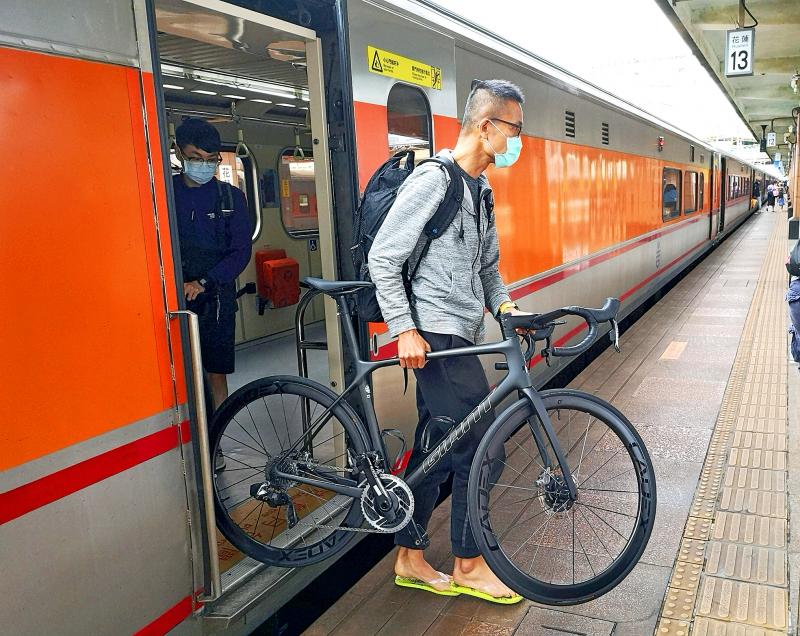
Photo: Mark Caltonhill
BUSES
Take the wheels off your bike, and most intercity coach companies will put this bag in the luggage lockers without raising an eyebrow. You can probably even carry it onto downtown buses assuming they’re not packed with commuters, but don’t tell the driver that Cycling Shorts said so.
UBER
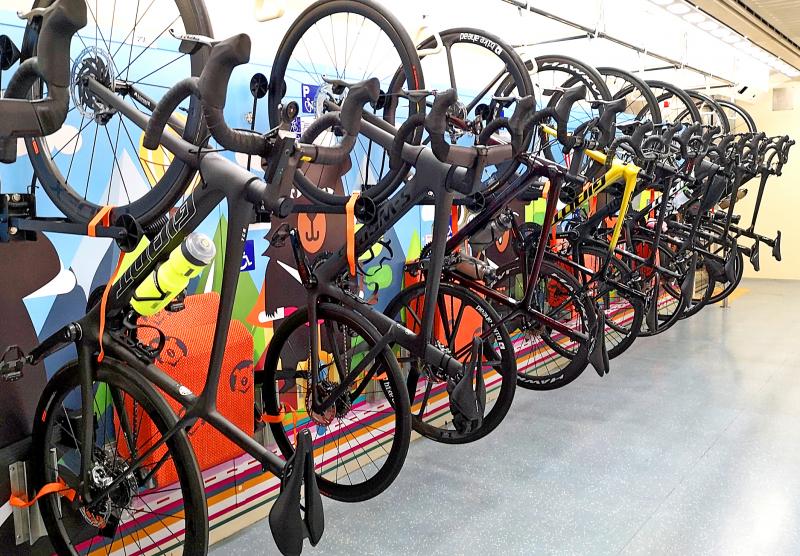
Photo: Mark Caltonhill
Uber drivers can take a little more persuading, especially since your breakdown was probably unplanned or you just ran out of energy, and you’re threatening to stow a dirty, broken-down piece of machinery into their trunk.
“Keep apologizing and take off your jacket and socks to cover the chain and rear derailleur,” says long-distance tourer Ritchie Tongo, and they’ll probably take you home or to the nearest bike shop.
MRT
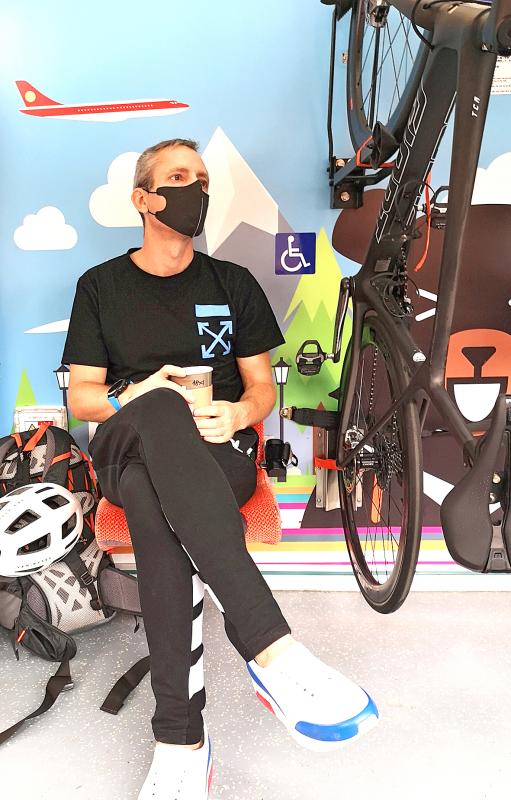
Photo: Mark Caltonhill
You can take a bagged bike on the Taipei Metro (MRT) system, though in theory this only applies to “folding bikes that are properly packed.” Regular cycles can be taken unpacked on weekends, holidays and between 10am and 4pm on weekdays. This costs a flat fare of NT$80, though certain stations and the entire Wenhu (brown) and Circular (yellow) lines are excluded.
HSR
The High Speed Rail (HSR) is even smoother, says triathlete Revital Shpangental. “Just cover your bike in a couple of plastic trash bags and they’ll let you on.” And at no extra cost.
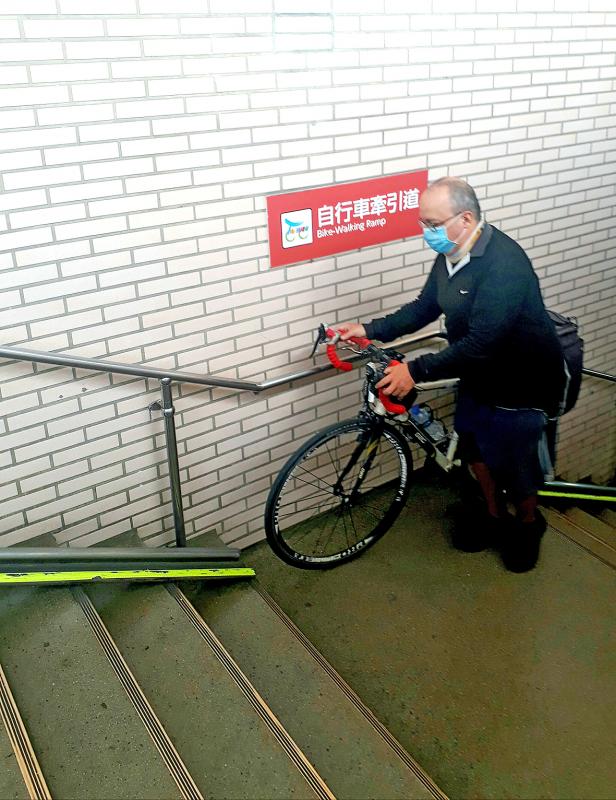
Photo: Mark Caltonhill
PLANES
Opening of the HSR in 2007 more or less ended the need to fly to destinations on the west coast, but with TRA trains stopping frequently on the 400km east coast line, taking a plane can still be attractive.
If you don’t exceed the weight limit, it won’t even cost you a penny, says fellow triathlete Darren Cole. “I usually go over and have to pay about NT$200,” which works out at about 5-10 percent of an adult ticket, depending on the destination and season.
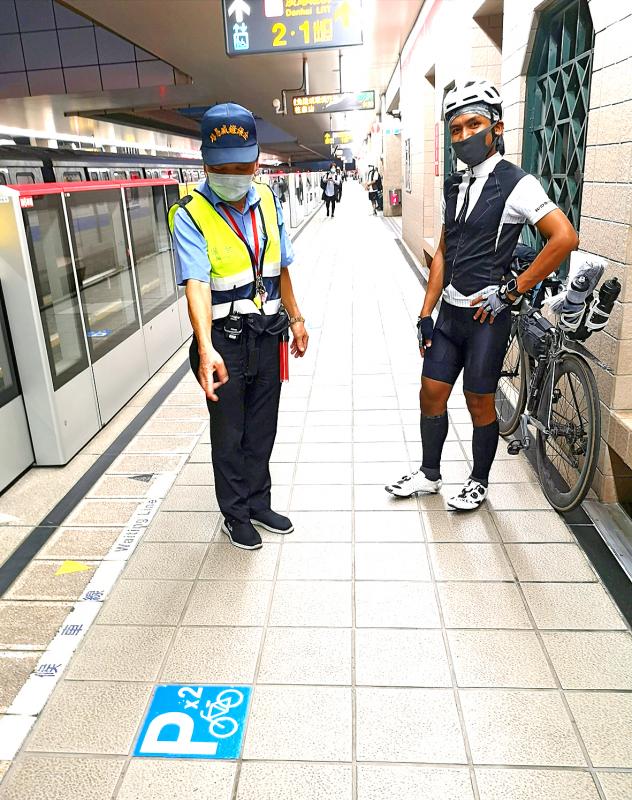
Photo: Mark Caltonhill
Different airlines have varying regulations. Mandarin Airlines, for example, charges NT$16/kg over the first free 10kg allowance to Taitung, where this year’s Half Ironman was held, and NT$14/kg to Penghu, where the full Ironman is usually held in non-COVID years. All companies stress the need to dismantle and bag the bike, preferably, but not necessarily, in a hard case.
“Taking your bike on an airplane can be a real pain,” says Nathan Miller who does most kinds of cycling, though like Tsai is a convert to trail riding. “It is kind of like going to the dentist: you have to trust a group of people you don’t know with something you use every day and you really love.”
Miller has a dinner party’s worth of nightmare anecdotes about taking bikes between Taiwan, Japan and the US, but says the only time he took a domestic flight, from Taipei to Hualien, it all went like clockwork.
“And it was faster than the train and super cheap.”
... AND BOATS
Flying obviously makes sense for getting to the outlying islands of Penghu, Kinmen, Matsu and Orchid Island. But boats are also available and, since the indigenous Tao (達悟族) people (known also as the Yami, 雅美族) of Orchid Island (蘭嶼) practice a largely maritime culture and livelihood, taking a boat to that destination might be both more appropriate. This adds NT$100 to the NT$1,150 ticket price from Houbihu (後壁湖) near Kenting or Taitung’s Fugang Harbor (富岡漁港).
A bike will similarly add NT$100 to the NT$460 price from Fugang to Green Island (綠島), which is still much less than a child. Boats to other outlying islands include NT$100 added to a NT$750 ticket from Budai (布袋) in Chiayi County to Penghu; and around NT$60 to any of the tickets to Kinmen and Matsu that start at NT$600 for a seat and go up to NT$5,000 for a first-class cabin.
Shorter journeys include NT$50 added to a NT$410 ticket from Donggang Wharf (東港漁港) to Siaoliouciou (小琉球); NT$10 to a NT$40 ticket (or NT$20 for e-ticket) on Kaohsiung’s Cijin (旗津) Ferry; and NT$25 to a NT$34 ticket between Tamsui and Bali in New Taipei City.
This last, at a child-and-a-half, is proportionally the most expensive way to transport a bike in Taiwan. But, since it could save you 8km at the end of a 1,050km round-island ride, it might feel like the best NT$25 you ever spent.
Mark Caltonhill bikes, and writes, and writes about bikes.

June 2 to June 8 Taiwan’s woodcutters believe that if they see even one speck of red in their cooked rice, no matter how small, an accident is going to happen. Peng Chin-tian (彭錦田) swears that this has proven to be true at every stop during his decades-long career in the logging industry. Along with mining, timber harvesting was once considered the most dangerous profession in Taiwan. Not only were mishaps common during all stages of processing, it was difficult to transport the injured to get medical treatment. Many died during the arduous journey. Peng recounts some of his accidents in

“Why does Taiwan identity decline?”a group of researchers lead by University of Nevada political scientist Austin Wang (王宏恩) asked in a recent paper. After all, it is not difficult to explain the rise in Taiwanese identity after the early 1990s. But no model predicted its decline during the 2016-2018 period, they say. After testing various alternative explanations, Wang et al argue that the fall-off in Taiwanese identity during that period is related to voter hedging based on the performance of the Democratic Progressive Party (DPP). Since the DPP is perceived as the guardian of Taiwan identity, when it performs well,

A short walk beneath the dense Amazon canopy, the forest abruptly opens up. Fallen logs are rotting, the trees grow sparser and the temperature rises in places sunlight hits the ground. This is what 24 years of severe drought looks like in the world’s largest rainforest. But this patch of degraded forest, about the size of a soccer field, is a scientific experiment. Launched in 2000 by Brazilian and British scientists, Esecaflor — short for “Forest Drought Study Project” in Portuguese — set out to simulate a future in which the changing climate could deplete the Amazon of rainfall. It is

The Taiwan People’s Party (TPP) on May 18 held a rally in Taichung to mark the anniversary of President William Lai’s (賴清德) inauguration on May 20. The title of the rally could be loosely translated to “May 18 recall fraudulent goods” (518退貨ㄌㄨㄚˋ!). Unlike in English, where the terms are the same, “recall” (退貨) in this context refers to product recalls due to damaged, defective or fraudulent merchandise, not the political recalls (罷免) currently dominating the headlines. I attended the rally to determine if the impression was correct that the TPP under party Chairman Huang Kuo-Chang (黃國昌) had little of a